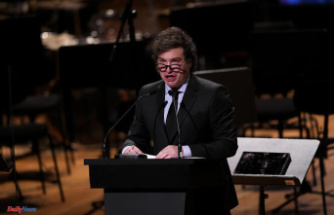Distrust of power is becoming more and more threatening in Haiti. “If [Prime Minister] Ariel Henry does not resign, if the international community continues to support him, we are heading straight towards a civil war which will lead to genocide,” declared, Tuesday March 5, Jimmy Chérizier, nicknamed “Barbecue », an influential gang leader in the small, poor Caribbean country plagued by heavy violence.
The armed bands, which control entire swaths of Haiti and a large part of the capital Port-au-Prince, announced last week that they were ganging up against the government and have since carried out attacks against infrastructure and strategic sites, taking advantage of a foreign trip by the Prime Minister. The Haitian capital has been under a state of emergency and curfew since Sunday, after the release of thousands of detainees by armed gangs.
“We need to come together. Either Haiti becomes a paradise for all of us, or a hell for all of us,” continued this 46-year-old former police officer, who became leader of a coalition of armed gangs nicknamed “the G9 family,” and targeted by UN sanctions. UN. “There is no question of a small group of rich people living in large hotels deciding the fate of the inhabitants of working-class neighborhoods,” he proclaimed again, equipped with a bulletproof vest, carrying a weapon and surrounded by hooded men.
Flights to Port-au-Prince canceled
Armed gangs attacked the police academy in the Haitian capital on Tuesday, after trying the day before to seize the Toussaint-Louverture international airport. The attack on the police academy, where more than 800 people are training, was repelled by police officers deployed as reinforcements, said Lionel Lazarre, coordinator of the National Union of Haitian Police Officers (Synapoha).
Several armed people stormed a police station near the airport and set it on fire, according to the same source. The unrest led international airlines to cancel all flights to Port-au-Prince.
This violence follows the assaults launched over the weekend against two prisons in Port-au-Prince, which resulted in the escape of thousands of inmates and around ten deaths. In response, the government declared a state of emergency and a three-day nighttime curfew, renewable until Wednesday inclusive.
This new “escalation” of violence has forced some 15,000 people to flee their homes in Port-au-Prince, UN spokesperson Stéphane Dujarric said Tuesday in New York, specifying that humanitarians had started distributing food and other basic necessities to three new displaced people sites.
The UN Security Council will meet behind closed doors on Wednesday on the subject, according to the Council's programme. Maria Isabel Salvador, United Nations representative in Haiti, will provide them with an update on the situation remotely.
Ariel Henry unable to return
After having been paralyzed, the capital nevertheless seemed, on Tuesday, to resume a semblance of activity, even if certain streets remain barricaded by stones and tree trunks put in place by residents to protect themselves, according to reports. journalists from Agence France-Presse (AFP). Transport is working again and businesses have reopened. Long queues stretch out in front of stores, banks and gas stations.
Ariel Henry, in power since the assassination in 2021 of President Jovenel Moïse, is trying, for his part, to return to Haiti and landed in Puerto Rico on Tuesday, while he was visiting Kenya last week to sign an agreement for sending Kenyan police officers to his country as part of an international mission supported by the UN and the United States.
According to local media Radio Télé Métronome, Ariel Henry was unable to return to Port-au-Prince due to the lack of security at the airport. According to the Dominican media CDN, the Prime Minister's private plane, departing from the American state of New Jersey, landed in Puerto Rico, an American territory in the Caribbean, after being refused a landing in the Dominican Republic, a neighboring country. from Haiti. Relations are tense between the two countries.
Sheila Anglero, spokesperson for the government of Puerto Rico, contacted by AFP, said she did not know if the Haitian prime minister was still on the island.
“Rethinking a new Haiti”
Haiti, the poorest country in the Americas, is facing a deep political, humanitarian and security crisis aggravated by the assassination of Jovenel Moïse, with a political process in total impasse.
According to the UN, more than 8,400 people were victims of gang violence last year, having been killed, injured or kidnapped, “an increase of 122% compared to 2022”.
Recognizing the abuses committed by gang members, the “Barbecue” leader on Tuesday called on society to move forward: “yes, we are aware that the armed men have committed acts harmful to society, but (…) I think that society must forgive them and unite to rethink a new Haiti,” he declared.












